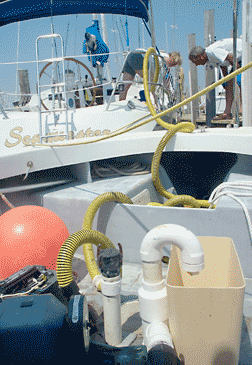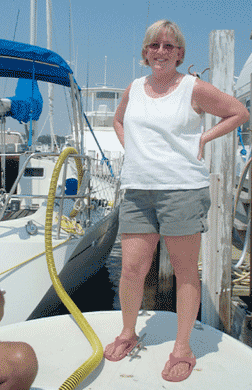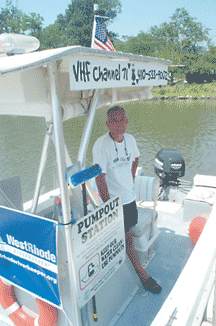Setting up ShopDeRogatis nabbed his full-time, paid summer job running the Honey Dipper in the spring, when he thought it would be a volunteer stint. The West/Rhode Riverkeeper’s pumpout boat came as a donation from the Annapolis Harbormaster last November. This spring, DeRogatis — whose other job is buying houses in Baltimore to fix up and sell — helped Riverkeeper Bob Gallagher make a few repairs to the old boat. A professional was called for the bigger jobs. Then weeks before the June 30 start-up, DeRogatis and Gallagher went to the Annapolis Harbormaster for a day of training on how to use the pump to service boaters. They didn’t know a lot about running a pump-out boat, DeRogatis says, but now he’s learned enough to feel comfortable on board. Annapolis runs a similar pump-out service, with more and bigger boats and more staff. And with fees starting at $5. “Annapolis is much more bureaucratic with official uniforms and badges,” DeRogatis said. “We’re much more casual.” At the training, his test was three boats tied up in a row. “Then I was on my own,” he said. Drumming Up Business“We schedule our boating around pumping out,” says sailor Jane Ford, who called the Honey Dipper in mid-July to pump out her 32-foot Elite sailboat, Seaquester, docked at Chesapeake Yacht Club on the West River. “I think the pump-out boat is a brilliant idea. It’s definitely a service that’s been needed. “There’s a pump here at the marina,” continues Ford, a first-time client. “But a lot of times, you’re out [on the water] and need to have your tank pumped.” Another early customer, Tory Salvia, called in after picking up a flyer from Leatherbury Point Marina on Parish Creek. “I was just getting ready to go off on a four-day cruise. This saved me a lot of time and inconvenience going to a pump-out station,” wrote Salvia in an email. Customers have seemed appreciative, but two weeks into the operation, business was slow. It picked up during the last part of July. As of August 1, 55 boats had been serviced by the Honey Dipper. Most days, you’ll find DeRogatis chatting up boaters at the Galesville public dock. Or out motoring on the rivers, looking for customers. But, he notes, with gas prices so high, it costs some $11 in fuel for every hour he’s motoring on the water. “We’re drumming up business because we want to show Maryland Department of Natural Resources that there is a need for us,” says DeRogatis, who gets his paycheck from DNR funds. Money for fuel and repair costs also comes from DNR; what DNR can’t cover comes from the Riverkeeper’s member contributions. If more grant money comes in, the Riverkeeper program could extend the season next year and perhaps add a newer boat. Gaining WasteThe Honey Dipper’s holding tank stores up to 300 gallons, but, DeRogatis says, “I don’t like to take on more than 150 gallons at a time,” because all that weight can make the boat hard to handle in choppy water. Filling the tank’s 300-gallon capacity would weigh nearly 3,000 pounds. So far, the pump-out boat has retrieved and disposed of more than 1,211 gallons of waste. Proper disposal of sewage — not pleasing boaters — is the Riverkeeper’s goal in this operation. Pumping out boats prevents waste from ending up in the rivers, delivering dangerous bacteria, viruses and nutrients directly into the water. Waste dumping is illegal in Chesapeake rivers and the Bay, and in any waters within three miles of the coast. Besides spoiling water quality for everyone in a classic Tragedy of the Commons, violators face fines of up to $2,000, if they get caught. Out in the ocean, however, sewage dumping is standard. “Boats can dump three nautical miles outside of the coastal shoreline,” says U.S. Coast Guard public affairs officer Ayla Stevens. However, federal and state law requires one of three types of systems to pretreat sewage waste, ranging from disinfecting to mechanically cutting waste to holding tanks or waste incinerators. Stevens says farther away, outside 25 nautical miles, a vessel can dump anything but plastic. At home, there’s no excuse to let sewage loose. An ever-growing number of Clean Marinas certified by the Maryland Department of Natural Resources offer well-maintained pump-out stations among their qualifications to earn this environmental honor. Some boaters, however, balk at paying the $5 fee to pump-out at a marina. “You’d think people who own boats wouldn’t worry about money, but they do,” says DeRogatis, who not only makes boat-calls but also pumps out holding tanks for free. That’s another plus for out-of-town boaters who may not know the location of one of the 10 marinas with pump-out stations in the West and Rhode rivers. Other impatient boaters balk at waiting in line for the marina’s pump-out station, complaining that queuing up wastes valuable water time. Marinas, DeRogatis says, are in support of the Honey Dipper — which saves their employees’ time in assisting pump-outs for individual boats. Five local marinas hooked up to the county sewers have agreed to work with the Riverkeeper; they’re where the Honey Dipper deposits its payload. But to stay in business — and prove to DNR that his service is needed — DeRogatis needs your boat’s waste. The Honey Dipper’s free pump-out service runs Thurs. thru Mon. 9am to 6pm through Labor Day at 410-533-9002 or hail Honey Dipper on VHF Channel 71. Absent boaters must sign a waiver before service, available at www.westrhoderiverkeeper.org/pumpout.shtml.
|
|
|
|
|
|
|
|
© COPYRIGHT 2007 by New Bay Enterprises, Inc. All rights reserved. |
|||||||||||||||||||||||||||




